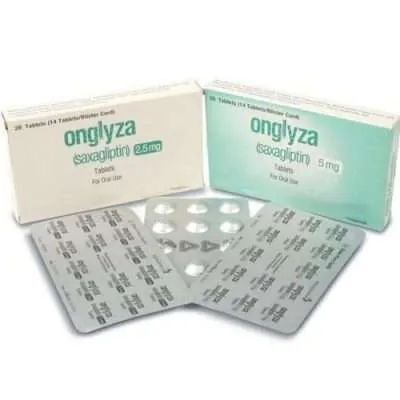Onglyza (Saxagliptin Hydrochloride)
$149.95 – $311.85
Onglyza
Saxagliptin Hydrochloride
Reasons to buy

Onglyza (Saxagliptin Hydrochloride)
Onglyza, also known as saxagliptin, is a daily oral prescription medication. It is indicated for adults with type 2 diabetes mellitus (T2DM) to improve glycemic control in addition to diet and exercise. Controlling hyperglycemia with Onglyza prevents downstream complications such as kidney damage, loss of limbs, blindness, heart attack, stroke, or nerve problems. It is important that diabetes remains controlled to lessen the chance of related complications. Onglyza is not recommended for the treatment of type 1 diabetes or diabetic ketoacidosis.
HOW DOES ONGLYZA WORK?
Incretins are peptide hormones produced by the gut that are rapidly secreted after a meal. The two primary incretins in humans include glucose-dependent insulinotropic polypeptide (GIP) and glucagon-like peptide-1 (GLP-1). Incretins such as GLP-1 potentiate glucose-dependent insulin secretion and cause many antihyperglycemic effects after their release from the gut into the blood. GLP-1 also decreases glucagon release from pancreatic alpha cells, thus lessening hepatic glucose release. These hormones, however, can become inactivated by the dipeptidyl peptidase 4 (DPP=4) enzyme. Onglyza is a DPP-4 inhibitor that slows down the inactivation of incretin hormones. This increases hormone concentrations in the bloodstream and decreases glucose levels after meals.
SIDE EFFECTS
Common side effects of Onglyza may include:
- Edema
- Headache
- Hypoglycemia
- Urinary tract infection
- Lymphocytopenia
- Hypersensitivity reactions (e.g. facial edema and urticaria)
WARNINGS AND PRECAUTIONS
Acute Pancreatitis
Patients treated with Onglyza have reported cases of acute pancreatitis. Patients should be monitored for pancreatitis signs, such as abdominal pain or vomiting. If these symptoms occur, Onglyza should be stopped immediately and the pancreatitis should be managed appropriately. Therapy with Onglyza should not be reinitiated in the presence of true pancreatitis.
Heart Failure
In a randomized trial, patients receiving Onglyza had greater hospitalization rates for heart failure compared to those taking placebo. Those with risk factors for heart failure such as renal impairment or prior heart failure history were at an increased risk. Providers should consider the risk-benefit profile of Onglyza before starting patients who are at risk for heart failure. Patients should seek medical attention if they develop heart failure symptoms and should be managed appropriately if a diagnosis is confirmed.
Hypoglycemia with Concomitant Use of Insulin Products
Onglyza can cause hypoglycemia when used in combination with other products that lower blood glucose, such as insulin. Dose adjustments to insulin may be required to prevent development of hypoglycemia. Patients should be made aware of other drugs that can potentiate the glycemic effects of Onglyza and cause hypoglycemia. Patients should also be counseled on typical signs and symptoms of low blood sugar.
Hypersensitivity Reactions
Onglyza has been shown to cause severe hypersensitivity reactions including anaphylaxis, angioedema, and exfoliative skin condition within 3 months of starting treatment. Patients with a history of hypersensitivity reactions with other DPP-4 inhibitors should be closely observed for allergic reactions. If anaphylaxis or angioedema occur, Onglyza should be stopped and the patient should seek medical attention.
Serious Arthralgia
Patients treated with DPP-4 inhibitors have reported serious cases of arthralgia occurring anywhere from immediately after starting therapy to years later. These patients had cessation of symptoms upon stopping the medication. Some patients had resurfacing of symptoms upon restarting the same medication or another DPP-4 inhibitor. If joint pain occurs, consider a DPP-4 inhibitor as a possible contributor and stop if needed.
Bullous Pemphigoid
Bullous pemphigoid has been reported in post-marketing cases of patients treated with DPP-4 inhibitors. Some cases required hospitalization, but individuals typically recovered with immunosuppressive support after stopping the DPP-4 inhibitor. Patients should notify their doctor if they experience erosions or blisters. If a bullous pemphigoid is present, Onglyza should be stopped and a dermatologist should be consulted.
DRUG INTERACTIONS
Strong CYP3A4/5 Enzymes
Onglyza exposure was markedly elevated with concomitant use of ketoconazole. This phenomenon is hypothesized to occur with other CYP3A4/5 inhibitors (e.g. clarithromycin, itraconazole, nefazodone, ritonavir, and saquinavir). When taking Onglyza with a strong CYP3A4/5 inhibitor, the dose of Onglyza should be reduced to 2.5 milligrams (mg).
Use With Insulin or Insulin Products
There is a higher risk of developing hypoglycemia when Onglyza is used simultaneously with insulin or insulin secretagogues. When starting Onglyza while on other insulin products, it is recommended to decrease the dose of other glycemic control drugs to lessen the chance of becoming hypoglycemic. Patients should monitor for common signs of hypoglycemia such as anxiety, palpitations, sweating, or confusion.
SPECIAL POPULATIONS
Pregnancy
There is limited evidence available on the use of Onglyza in pregnant women. Therefore, no clear conclusions can be drawn about the risk of birth defects or miscarriages when using Onglyza. However, no adverse effects occurred in pregnant rats and rabbits. The risk-benefit should be considered by the provider, as poorly controlled diabetes during pregnancy can lead to birth defects, stillbirth, or complications.
Lactation
No data exists on Onglyza’s effect on human milk, a breastfed infant, or milk production. Onglyza is present in lactating rats’ milk. Providers should consider the benefits of breastfeeding and weigh them with the risks of potential adverse events of breastfeeding while on Onglyza.
Pediatrics
Onglyza has not been studied in patients under the age of 18, and therefore safety and efficacy in pediatrics cannot be confirmed. In addition, there are no studies that have evaluated the pharmacokinetics of Onglyza in younger patients.
Geriatrics
In clinical trials, there was no difference in safety or effectiveness between younger patients and patients older than 65 years of age. However, increased sensitivity in geriatric patients cannot be discounted. Onglyza is renally eliminated, and as many elderly patients have lessened renal function, older patients and providers should proceed with caution with Onglyza.
Renal Impairment
Onglyza was administered to renally impaired patients, some with end-stage renal disease (ESRD) in one study. The occurrence of adverse events was similar between those treated with Onglyza and those treated with placebo.
| Quantity | 2.5mg – 30 tabs, 5mg – 30 tabs, 5mg – 100 tabs |
|---|
